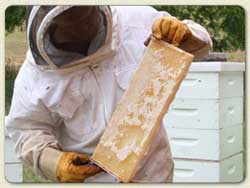 |
Canku Ota
|
 |
|
(Many Paths)
|
||
|
An Online Newsletter
Celebrating Native America
|
||
|
October 1, 2009 - Volume
7 Number 10
|
||
|
|
||
|
Tribal Honey Takes
Blue Ribbon
|
||
|
by Tessa Lehto, Shakopee
Mdewakanton Sioux Community
|
||
|
credits: photo courtesy
of Shakopee Mdewakanton Sioux Community
|
|
This was the first time SMSC Honey was entered in the State Fair. The honey was judged on its container (appearance and cleanliness), its color (conformity to schedule), the volume (accuracy and uniformity of the fill of the container), absence of impurities, percentage of moisture, clarity (absence of crystals and bubbles), and flavor (absence of off-aroma or flavor). The honey was collected and bottled by staff in the SMSC Land and Natural Resources Department.
This was the first time SMSC Honey was entered in the State Fair. The honey was judged on its container (appearance and cleanliness), its color (conformity to schedule), the volume (accuracy and uniformity of the fill of the container), absence of impurities, percentage of moisture, clarity (absence of crystals and bubbles), and flavor (absence of off-aroma or flavor). The honey was collected and bottled by staff in the SMSC Land and Natural Resources Department.
More than 3 million honeybees in the 60 hives maintained by the SMSC produced 400 gallons of excess honey during the summer of 2009 which was extracted for bottling. The 40,000-60,000 honeybees in each hive feed primarily on sweet and red clover as well as alfalfa but they also pollinate apples, plums, cherries, raspberries, and some native prairie plants. The hives are located in six different natural areas of the reservation not easily accessible to the public.
Bees make honey to use as a food source to get them through the winter. It is their excess honey that bees store in boxes placed above their hive which is harvested by SMSC staff and Community youth. In 2001 the SMSC Land and Natural Resources Department started the honeybee program with four hives. The success of those hives resulted in the creation of new hives from splitting the existing hives and acquiring new ones available commercially. Staff tend to the hives on a regular basis to maintain a healthy hive and harvest honey as needed. The SMSC hives are healthy and have not been impacted by colony collapse disorder, which has affected honeybees in many areas of the country.
Honey is available for sale at several locations - in Prior Lake at the Shakopee Dakota Convenience Stores and Mystic Lake Casino Hotel Gift Shop. In Minneapolis it is available at The Wedge Co-op and Linden Hills Co-op. The 24 ounce plastic bottle sells for $7.00 while the 32 ounce jar sells for $8.00.
The SMSC produces pure, raw honey. SMSC Honey is filtered twice through stainless steel mesh baskets. It is not pasteurized, hydrogenated, or mixed with other honey from other areas. SMSC’s natural processing results in honey with high quality taste and a full complement of natural enzymes associated with antiseptic and healing properties. Much of the honey produced today throughout the country is not pasteurized; for this reason, infants under one year of age should not eat it. On a cool shelf, (50-60 degrees) honey has a shelf life counted by years, not weeks or months. If the natural sugar in it starts to crystallize, simply put the container in a pan of warm water and let it sit until it dissolves. It is not recommended to boil or use a microwave to dissolve crystals in honey.
As a steward of the land, the SMSC engages in a number of restoration activities to preserve and protect the land for future generations. The SMSC Land and Natural Resources Department has re-established native prairies on more than 500 acres of former farmland. Prescribed burns are used to maintain and improve native prairie conditions on the reservation. Wild rice is sowed in Community wetlands. Staff also maintain native maple-basswood forests from which they produce maple syrup that is sold at the same locations as SMSC honey. Trees and other native flora are planted. Environmental specialists are also active in restoring and managing wetlands, surveying wildlife, and taking an inventory of existing natural communities. Staff have documented some of the positive effects of these activities by water quality improvements. Hydrologists assess water quality, coordinate the Community’s Wellhead Protection Program, plan projects to improve water quality, and implement erosion control. |
|
|
||
|
|
||
| Canku Ota is a free Newsletter celebrating Native America, its traditions and accomplishments . We do not provide subscriber or visitor names to anyone. Some articles presented in Canku Ota may contain copyright material. We have received appropriate permissions for republishing any articles. Material appearing here is distributed without profit or monetary gain to those who have expressed an interest. This is in accordance with Title 17 U.S.C. Section 107. | ||
|
Canku Ota is a copyright ©
2000, 2001, 2002, 2003, 2004, 2005, 2006, 2007, 2008, 2009 of Vicki
Barry and Paul Barry.
|
||
 |
 |
|
|
The "Canku
Ota - A Newsletter Celebrating Native America" web site and
its design is the
|
||
|
Copyright ©
1999, 2000, 2001, 2002, 2003, 2004, 2005,
2006, 2007, 2008, 2009 of Paul
C. Barry.
|
||
|
All Rights Reserved.
|
||
 Prior
Lake, MN – Honey produced and bottled by the Shakopee Mdewakanton
Sioux Community recently won a blue ribbon at the 2009 Minnesota
State Fair. The blue ribbon was awarded in the light amber novice
class. SMSC Honey also came in fourth in the white honey novice
class.
Prior
Lake, MN – Honey produced and bottled by the Shakopee Mdewakanton
Sioux Community recently won a blue ribbon at the 2009 Minnesota
State Fair. The blue ribbon was awarded in the light amber novice
class. SMSC Honey also came in fourth in the white honey novice
class.